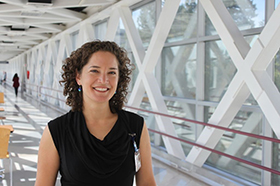OHSU Improving Addiction Care Team (IMPACT)


Understand
Our aim is to meet people where they are and support each individuals’ goals, motivations and needs related to exploring different substance use disorder treatment options.

Engage
We offer comprehensive substance use disorder care during hospitalization, including medication, harm reduction, peer support and connection to community resources.

Collaborate
We work closely with patients and their loved ones, healthcare providers and community partners to support patients’ goals around substance use and health.

Research
We use research to understand, innovate, and improve our evidence-based care for people with substance use disorder.

Equity
We promote equity and justice, using patient and health system narratives to reduce stigma of substance use.

Transform
We use education; research; advocacy; and compassionate, evidence-based care to transform hospital and health systems.
OHSU’s IMPACT program works to change the standard of care for hospitalized adults with substance use disorders.
IMPACT is supported by partnerships with CareOregon and OHSU Health IDS.
Hospital-based addictions care
IMPACT is an interprofessional team. Our program is made up of addiction medicine doctors, advanced practice providers, social workers, nurses, pharmacists and peers with lived experience in addiction and recovery. We offer addiction medicine consults to hospitalized patients with substance use disorder.
Together, our team:
- Provides patients with evidence-based treatment including medications, behavioral treatment and support to reduce the harms of drug use.
- Shares resources to help patients continue treatment and access services in their community after discharge.
- Supports patients in working toward their goals and priorities.
- Collaborates with clinicians and hospitals to help them better serve patients with substance use disorders.
IMPACT works with community organizations, health care payers and academic partners, including:
- The OHSU Harm Reduction and Bridges to Care clinic, which provides on-demand buprenorphine treatment and other addiction services through telemedicine and in-person visits. Buprenorphine is a medication that can help people reduce or quit their use of heroin or other opiates.
- Mental Health & Addiction Association of Oregon (MHAAO), which promotes self-directed recovery through peer services for those experiencing mental health or addiction challenges.
- Housing organizations and community partners with expertise in addiction treatment, harm reduction services, peer services and advocacy.
- Partners that help pay for our program, including Oregon coordinated care organizations.
- Medical students, public health students, OHSU Addiction-Medicine Fellows and others whose research supports our ability to lead change.
Transforming health systems
IMPACT started at OHSU in 2015, taking an innovative approach to the growing substance-use crisis in our region. Now we are expanding to share our experience with providers, hospital teams and researchers across Oregon and beyond.
For more than 130 years, OHSU has focused on improving the health of all Oregonians through education, research and health care delivery. IMPACT plays a critical role in supporting OHSU’s public mission, as hospitalizations among people with substance use disorder are on the rise.
There is a pressing need for hospitals and health systems to address addiction. The epidemic is reaching crisis levels, with record overdose deaths and increasing alcohol-related deaths. Yet patients often experience stigma and discrimination in health care settings. Most hospitals don't have systems to adequately address addiction, and medical providers may have little or no addiction training.
IMPACT is working to change this. To date, we have developed better systems of care by:
- Adding IMPACT programs at Hillsboro Medical Center and Adventist Health Portland.
- Leading telementoring programs for hospitals and hospital-based providers across Oregon and the U.S. These programs support education and best practices in addictions care, in partnership with the Oregon ECHO Network. Through ECHO, we have trained hundreds of providers in more than half of Oregon’s 62 hospitals.
- Implementing a National Institutes of Health-funded, multisite study to offer hospital-based opioid treatment. This includes medication for opioid use disorder during hospitalization and treatment linkage after hospital discharge.
Evidence-based approach
IMPACT is the most rigorously studied addiction medicine consult service in the United States. We’ve shown that our approach improves health outcomes during and after hospitalization and is transforming health systems.
Research shows that IMPACT leads to:
- Increased engagement in substance use disorder treatment. Almost three quarters (72%) of patients who worked with IMPACT began medication for opioid or alcohol use disorder or both. Patients who worked with IMPACT also were twice as likely to get treatment for their substance use disorder after hospital discharge compared to patients who were not part of IMPACT.
- Decreased substance use: When working with IMPACT, patients report using fewer substances after a hospital stay. Many report abstaining from at least one substance.
- Lower costs: Patients who were part of IMPACT spent fewer days in the hospital and were more likely to see a primary care or behavioral health provider after hospital discharge.
- Increased patient trust: Trust is essential in patient-doctor relationships for good patient health. Most patients had an increased level of trust in hospital physicians after working with IMPACT.
- Improved provider understanding: Hospital staff reported that working with IMPACT increased their understanding of addiction and its treatment. Staff also reported fewer negative views of patients with substance use disorders. IMPACT helped alleviate the feeling of “moral distress” that hospital staff felt caring for patients before working with the program.
Overdose awareness and naloxone
Learn to recognize the signs of overdose and how to use naloxone, an overdose prevention medication.
Contact us
Email OHSU’s IMPACT program:
impactadmin@ohsu.edu
Call the OHSU Addiction Consult Line: 503-494-4567, 8 a.m.-5 p.m. weekdays
‘Stigma is a huge driver’

IMPACT director Honora Englander explains why OHSU’s program is one of only a few hospital-based addiction programs in the nation.
Study: People addicted to opioids die as often as those with heart attacks

Health systems need to better integrate and destigmatize the care these patients need, IMPACT program leaders say.